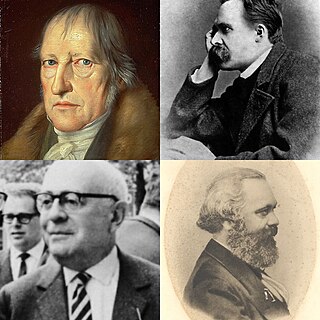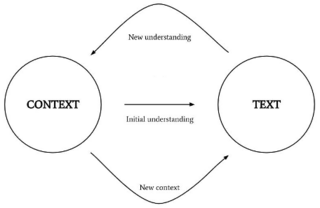
Hans-Georg Gadamer was a German philosopher of the continental tradition, best known for his 1960 magnum opus on hermeneutics, Truth and Method.

Martin Heidegger was a German philosopher who is best known for contributions to phenomenology, hermeneutics, and existentialism. His work covers a wide range of topics including ontology, technology, art, metaphysics, humanism, language and history of philosophy. He is often considered to be among the most important and influential philosophers of the 20th century, specially in the continental tradition.

A genre of arts criticism, literary criticism or literary studies is the study, evaluation, and interpretation of literature. Modern literary criticism is often influenced by literary theory, which is the philosophical analysis of literature's goals and methods. Although the two activities are closely related, literary critics are not always, and have not always been, theorists.

Hermeneutics is the theory and methodology of interpretation, especially the interpretation of biblical texts, wisdom literature, and philosophical texts. As necessary, hermeneutics may include the art of understanding and communication.

German philosophy, meaning philosophy in the German language or philosophy by German people, in its diversity, is fundamental for both the analytic and continental traditions. It covers figures such as Gottfried Wilhelm Leibniz, Immanuel Kant, Georg Wilhelm Friedrich Hegel, Karl Marx, Friedrich Nietzsche, Martin Heidegger, Ludwig Wittgenstein, the Vienna Circle, and the Frankfurt School, who now count among the most famous and studied philosophers of all time. They are central to major philosophical movements such as rationalism, German idealism, Romanticism, dialectical materialism, existentialism, phenomenology, hermeneutics, logical positivism, and critical theory. The Danish philosopher Søren Kierkegaard is often also included in surveys of German philosophy due to his extensive engagement with German thinkers.

Friedrich Daniel Ernst Schleiermacher was a German Reformed theologian, philosopher, and biblical scholar known for his attempt to reconcile the criticisms of the Enlightenment with traditional Protestant Christianity. He also became influential in the evolution of higher criticism, and his work forms part of the foundation of the modern field of hermeneutics. Because of his profound effect on subsequent Christian thought, he is often called the "Father of Modern Liberal Theology" and is considered an early leader in liberal Christianity. The neo-orthodoxy movement of the twentieth century, typically seen to be spearheaded by Karl Barth, was in many ways an attempt to challenge his influence. As a philosopher he was a leader of German Romanticism. Schleiermacher is considered the most important Protestant theologian between John Calvin and Karl Barth.
Continental philosophy is an umbrella term for philosophies prominent in continental Europe. Michael E. Rosen has ventured to identify common themes that typically characterize continental philosophy. These themes proposed by Rosen derive from a broadly Kantian thesis that knowledge, experience, and reality are bound and shaped by conditions best understood through philosophical reflection rather than exclusively empirical inquiry.

Wilhelm Dilthey was a German historian, psychologist, sociologist, and hermeneutic philosopher, who held Georg Wilhelm Friedrich Hegel's Chair in Philosophy at the University of Berlin. As a polymathic philosopher, working in a modern research university, Dilthey's research interests revolved around questions of scientific methodology, historical evidence and history's status as a science.

Being and Time is the 1927 magnum opus of German philosopher Martin Heidegger and a key document of existentialism. Being and Time is among the most influential texts of 20th century philosophy. It had a notable impact on subsequent philosophy, literary theory and many other fields. Though controversial, its stature in intellectual history has been compared with works by Kant and Hegel. The book attempts to revive ontology through an analysis of Dasein, or "being-in-the-world." It is also noted for an array of neologisms and complex language, as well as an extended treatment of "authenticity" as a means to grasp and confront the unique and finite possibilities of the individual.
Interpretivism is a school of thought in contemporary jurisprudence and the philosophy of law.
Verstehen, in the context of German philosophy and social sciences in general, has been used since the late 19th century – in English as in German – with the particular sense of the "interpretive or participatory" examination of social phenomena. The term is closely associated with the work of the German sociologist Max Weber, whose antipositivism established an alternative to prior sociological positivism and economic determinism, rooted in the analysis of social action. In anthropology, Verstehen has come to mean a systematic interpretive process in which an outside observer of a culture attempts to relate to it and understand others.
Hans Ludwig David Paul, Graf Yorck von Wartenburg was a German lawyer, writer, and philosopher.

The hermeneutic circle describes the process of understanding a text hermeneutically. It refers to the idea that one's understanding of the text as a whole is established by reference to the individual parts and one's understanding of each individual part by reference to the whole. The circle is a metaphor for the procedure of transforming one's understanding of the part and the whole through iterative recontextualization.
Critical reading is a form of language analysis that does not take the given text at face value, but involves a deeper examination of the claims put forth as well as the supporting points and possible counterarguments. The ability to reinterpret and reconstruct for improved clarity and readability is also a component of critical reading. The identification of possible ambiguities and flaws in the author's reasoning, in addition to the ability to address them comprehensively, are essential to this process. Critical reading, much like academic writing, requires the linkage of evidential points to corresponding arguments.

Lebensphilosophie was a dominant philosophical movement of German-speaking countries in the late 19th and early 20th centuries, which had developed out of German Romanticism. Lebensphilosophie emphasised the meaning, value and purpose of life as the foremost focus of philosophy.
Common sense is "knowledge, judgement, and taste which is more or less universal and which is held more or less without reflection or argument". As such, it is often considered to represent the basic level of sound practical judgement or knowledge of basic facts that any adult human being ought to possess. It is "common" in the sense of being shared by nearly all people. The everyday understanding of common sense is ultimately derived from historical philosophical discussions. Relevant terms from other languages used in such discussions include Latin sensus communis, Ancient Greek κοινὴ αἴσθησις, and French bon sens. However, these are not straightforward translations in all contexts, and in English different shades of meaning have developed. In philosophical and scientific contexts, since the Age of Enlightenment the term "common sense" has been used for rhetorical effect both approvingly and disapprovingly. On the one hand it has been a standard for good taste, good sense, and source of scientific and logical axioms. On the other hand it has been equated to conventional wisdom, vulgar prejudice, and superstition.
World disclosure refers to how things become intelligible and meaningfully relevant to human beings, by virtue of being part of an ontological world – i.e., a pre-interpreted and holistically structured background of meaning. This understanding is said to be first disclosed to human beings through their practical day-to-day encounters with others, with things in the world, and through language.
Jean Grondin is a Canadian philosopher and professor. He is a specialist in the thought of Immanuel Kant, Hans-Georg Gadamer, and Martin Heidegger. His research focuses on hermeneutics, phenomenology, German classical philosophy and the history of metaphysics.

Andrzej Wierciński is a hermeneutician, philosopher, and theologian. As the transdisciplinary thinker, he is Professor of Liberal Arts, Faculty of Artes Liberales at the University of Warsaw, President-Founder (2001) of the International Institute for Hermeneutics (IIH), and President of Agora Hermeneutica (IIH).

Cynthia R. Nielsen is an American philosopher and Professor of Philosophy at the University of Dallas. She is known for her expertise in the field of hermeneutics, the philosophy of music, aesthetics, ethics, and social philosophy. Since 2015 she has taught at the University of Dallas. Prior to her appointment at the University of Dallas, she taught at Villanova University as a Catherine of Sienna Fellow in the Ethics ProgramArchived 2018-12-19 at the Wayback Machine. Nielsen serves on the executive committee of the North American Society for Philosophical Hermeneutics.











